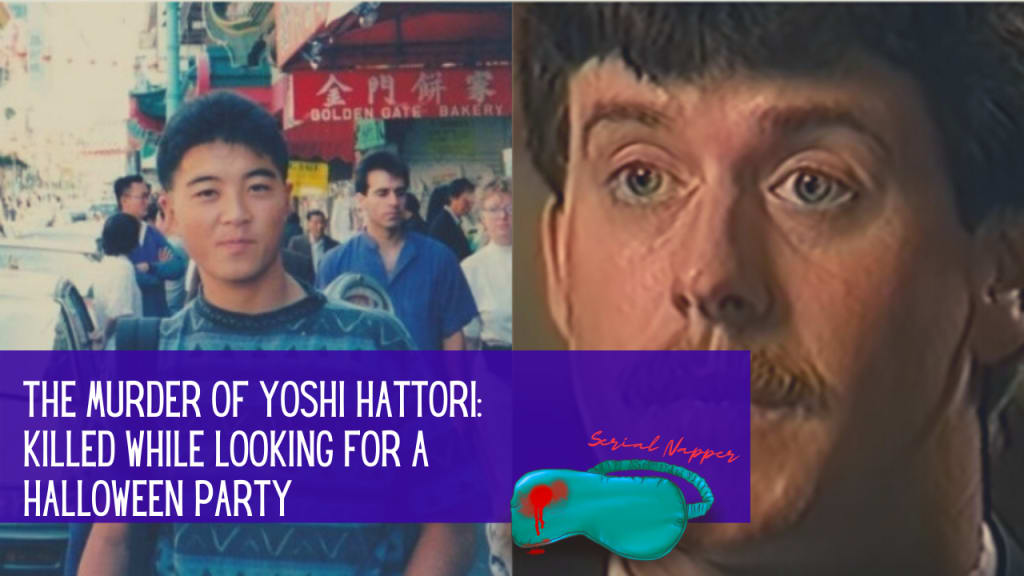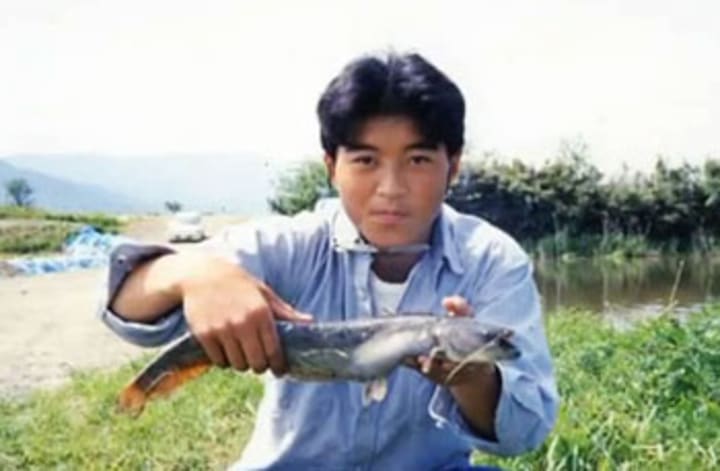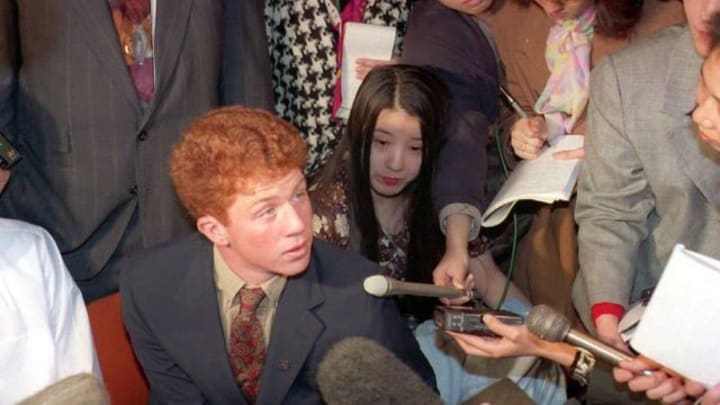The Murder of Yoshi Hattori, Killed While Looking for a Halloween Party
We are coming up on the 29th anniversary of when this murder happened and unfortunately not much has changed.

Let’s start with a little bit about who Yoshihiro Hattori was. He was born in Nagoya, Japan, which for reference is about 4 and a half hours away from Tokyo, to his mother Mieko and his father Masaichi — and I want to bring them up now because they play a big part in this story.
Yoshihiro, who also went by Yoshi, was the middle child; he had a sister and one brother, but was known to be the most lively of the bunch. While attending high school in Japan, he loved to play on the rugby team — it was an absolute passion of his, his parents said he was crazy about rugby. He also loved to fish in his spare time and was really interested in anything related to America. A lot of people here in Japan still are, especially the younger generations. They see things on TV and they have a very idealistic vision of what it’s like there. So he applied to the American Field Service (AFS) student exchange program, not really thinking anything of it. Actually, even though he had applied he was still really nervous about the idea of moving to the U.S. for a year, which is understandable. I can’t imagine leaving my family and going to a foreign country for a whole year at just 16 years old.
In his entrance paper for the program, he wrote:
“Wherever I go, I wish I could make the country a second home country. I can make Japanese cooking like tempura cutlet for host families and introduce the living way of Japanese.”

That worry and anxiety went away the moment he learned that he had passed the admittance test for the program and was selected to go. All of the fear was replaced with absolute excitement. It was the opportunity of a lifetime, to receive this scholarship and to be able to learn and study in America for a year, learn english, and meet new people. I think when many people think of how they perceive the Japanese to be, they think quiet, reserved and introverted. However, Yoshi was quite extroverted and outgoing. He was talkative and excitable. So when he moved to America for the year, he made quite the impression on everyone he met, especially his host parents.
In 1992, at 16 years old, he was off to Baton Rouge, enrolled in East Baton Rouge’s first program for gifted students, to live with the Haymaker family for the school year. The Haymakers consisted of father and husband, Dick Haymaker, who was a theoretical physicist, wife and mother, Dr. Holley Haymaker, a physician, and their 16 year old son Webb Haymaker.
When recounting their time with Yoshi, Holley said, “Yoshi was very ebullient, a total extrovert. The kids at McKinley High School loved him because he was such a free spirit.”
Her husband Dick said, “He was a really, really extraordinary guy. He was life. He moved through space like a dancer.”
And he got along really well with their son Webb. They would do everything together, including attending a blues festival, which would have been a new experience for Yoshi. It was a really good fit with Yoshi and the Haymakers.
While Yoshi was an avid rugby player while living in Japan, he decided to try something completely different and out of his comfort zone while living in America — he decided to take jazz dance classes. And — not surprisingly, he excelled at jazz too! Yoshi was so committed to his jazz dance classes that Holley bought him a bicycle with lights and a helmet so that he could get to all of his classes easily.
Yoshi had only been living in the U.S. with his homestay family for 2 months when he and Webb were invited to a Halloween party that was organized for all of the local Japanese exchange students. The party was set for October 17th and Yoshi was really excited about it. This would be his very first Halloween in America and he wanted to fully embrace it and enjoy it. I’m about to enjoy my 4th Halloween here in Japan and while it’s definitely caught on since the 90’s, I can’t imagine Halloween celebrations were very prevalent back then. Even today, trick or treating isn’t really a thing unless you live in an international community. But they are big on dressing up and partying downtown Tokyo. In Nagoya, where Yoshi was from, I doubt Halloween was celebrated in the 90’s.
Yoshi had recently started watching a lot of John Travolta movies and became a big fan of his stuff — so he decided for a costume he would go dressed to the party in Travolta’s famous “Saturday Night Fever” white disco suit. He wore a white Tuxedo and slicked his hair back. His homestay brother Webb had recently injured himself in a swimming pool and was required to wear a neck brace — so he decided to add a few bandages and go to the party dressed as an accident victim.
So in the early evening of October 17th, the pair set off for the party, all dressed up in their costumes. They had the address written down on a piece of paper, of course it’s important to remember that this was before cell phones and Google maps. The Halloween party was to take place in a town called Central, located just outside of Baton Rouge. It was a quiet working-class neighborhood. Admittedly, Webb wasn’t super familiar with the area so the pair got a little turned around and had difficulty finding the home. They were looking for a home with house number 10131, but they couldn’t find it. Then they spotted a home with house number 10311. It had been decked up in Halloween decorations and had three cars parked in the driveway, so they thought this must be it.
They parked their car, got out of the vehicle, walked up to the front door, and rang the doorbell. They listened for any noise inside the home as they waited for someone to answer the door, but they didn’t hear anything and no one came, so they figured they must have the wrong house. The two boys began walking back to their car when they heard someone open the side door leading to the carport. It was one of the homeowners, a woman named Bonnie Peairs, who had opened the door to peer out. Webb and Yoshi moved towards the side door to ask whether or not they were at the right home, but Bonnie quickly closed the door. She panicked, apparently thinking that these two young men were there to harm her, so after closing the door she called to her 30 year old husband Rodney to grab his gun.
Whatever Bonnie was thinking or feeling at the time, caused her to call for her husband to grab his gun. When Yoshi and Webb saw the woman close the door without saying a word to them, they figured that this was in fact the wrong house and they began walking back towards their car again. They were really confused why they had the door slammed in their face and just wanted to get to the house and party they were looking for.
Then — the side door opened again, but this time it wasn’t Bonnie. It was her husband Rodney, and he was holding a 44 Magnum revolver, pointed right at the boys, and he yelled at them “freeze!” The term “freeze” doesn’t exactly translate to stop in Japan, so it’s likely that Yoshi didn’t understand what the man was demanding, or that he didn’t process what was happening because people don’t just point guns at each other in Japan — or if he maybe thought it was a Halloween prop, because again, guns are not very common in Japan.
But either way, Yoshi walked towards the house, saying “we’re here for the party”. Webb tried to yell at Yoshi to watch out and move away from the man, but it was too late. Rodney fired his gun at Yoshi, hitting him in the chest from about only 5 feet away, then Rodney and Bonnie went back into their house, slamming the door.
Yoshi fell onto the driveway payment and Webb ran to help his friend. He remembers Yoshi was crying and moaning, but still awake. He was badly hurt, bleeding profusely so Webb ran to the neighbors house and begged for them to call 911, which they did. Then the neighbor went with Webb to see if they could try to help Yoshi by attempting to stop the bleeding. At this point the neighbor had no idea that it was actually Rodney who had shot the 16 year old, so he shouted towards the home for help — but Bonnie responded with a quick “go away”.
And again — this blows my mind. Maybe you were terrified at the moment, maybe. But the individual is now laying on the ground bleeding out and you can take a second to see that it’s a 16 year old boy in a Halloween costume. But instead you’re inside hiding telling everyone to go away. It’s really difficult to comprehend.
It took the ambulance 40 minutes to arrive and unfortunately it was much too late to save Yoshi. The bullet had pierced the upper and lower lobes of his lung, exiting through where the seventh rib is situated. He had lost far too much blood from being shot at close range and died.
Meanwhile, across town, Dick and Holley Haymaker were leaving the movie theatre when their pager went off. With the boys supposed to be attending the Halloween party, they thought it would be a good time to enjoy a date night. When Holley called the number back, it was the police notifying her that there had been an incident. Their son Webb was fine, but Yoshi was not. They were asked to come down to the police station.
When they arrived at the police station they found Webb sitting in the hall alone. After speaking with the police they were horrified to learn what happened. It didn’t make any sense. And now the Haymakers, who were responsible for taking care of Yoshi while he was living in and learning about America, would have to tell his parents that he had been killed. When Yoshi’s mother Mieko learned that her son had been shot and killed, she went into his bedroom back in his home in Nagoya and wept. Two days later, Yoshi’s parents arrived from Japan to retrieve their son’s body. They embraced the Haymaker family, not angry at them for Yoshi’s death, very concerned with their well being after this trauma.

Now, what about Rodney Peairs, the man who had shot and killed Yoshi? He was questioned by police at the scene but was released because they found that he was well within his rights to shoot a trespasser on his property. In Louisiana deadly force may be used, without an obligation to retreat, whenever a person is in imminent danger of being killed or facing great bodily harm and that deadly force is necessary to prevent the killing or serious injury. They have something called “castle laws”, which basically allowed the use of force, deadly or otherwise, to protect oneself or property, or “castle.”
The “castle law” establishes that homicide is justifiable in particular circumstances:
when committed in self-defense by one who “reasonably believes” he is in danger of great bodily harm or death
to prevent a forcible felony; and to prevent trespass on private property.
To me, I would think the keywords here are “reasonably believes” he is in danger. We’re talking about two 16 year old unarmed boys, who rang the doorbell and did not even get a chance to communicate why they were there. And Yoshi’s family felt the same way — of course. They couldn’t understand how someone could just shoot an innocent teenage boy without consequence. They worked with the Japanese authorities who worked with the Louisiana governor to bring about manslaughter charges.
But the trial was, in my opinion, outrageous. Yoshi’s parents flew to America for the trial and to have to sit there and listen to what was said in court must have been so painful for them. Rodney Peairs claimed that on that night, he said, Yoshi was acting in a menacing, “aggressive” fashion, like a stranger invading someone’s home turf. He said that the 16 year old had an “extremely unusual manner of moving,” noting that any reasonable person would find the teen “scary.”
The lawyer for Rodney Peairs, a man by the name of Lewis Unglesby, was literally quoted as saying the following during the trial,
“This is not an American or Oriental or any other known being casually walking up to the front door and saying, ‘Hello, we’re looking for the party,’ “ “That’s not what happened.” Yoshi had an extremely unusual way of moving,” “It’s been described as aggressive. It’s been described as kinetic. It’s been described as antsy.”
By contrast, they portrayed Rodney as your average Joe. A hard working good mechanic and employee of the Winn-Dixie supermarket. And said he, "cried and cried" when he learned that he had killed Yoshi.
It’s really difficult for me to remain unbiased in this story, as we are talking about a 16 year old boy who simply rang the doorbell and said, “we’re here for the party”. I can’t comprehend how a 30 year old man with a loaded weapon would be so intimidated and fearful for his life so as to shoot him dead. But clearly, the courts did not agree, because after seven days Rodney Peairs was acquitted.
While all of this was going on in the states, news of Yoshi’s murder and the trial were making major headlines in Japan. There was major outrage, with many people thinking that the killing was racially motivated. Bonnie Peairs described how she thought that the white teenager, Webb, was simply hurt — and she wasn’t fearful for her life until she saw Yoshi, even noting that she couldn’t tell if he was Asian or Hispanic. The general consensus in Japan was that the acquittal was to be expected because “the whole American society is obsessed with guns.” They showed video footage of the courtroom spectators cheering and clapping when the verdict was announced. There was shock and dismay how this man was described in such a positive light, after killing a young man. In 2014, there were just six gun-related deaths in Japan, a country of 127 million people. In the same year, there were 33,599 gun-related deaths in the US.
It’s pretty easy to see how this became a huge talking point. How it would compare and contrast the two countries’ views on guns.
One article ran in a Japanese magazine shortly after the trial was titled, “Here’s how to avoid being killed in America” and gave the following tips:
- Form friendships with locals and learn their survival skills
- Go native in appearance. (Males should grow facial hair as it will make them look more Hispanic in appearance.)
- Carry your money in two different places, so in case you’re robbed, you’ll still have a stash to get you home.
- Under no circumstances should you put up resistance against an armed robber.
Some of the article was sarcasm and some of it was very serious in intention. Japan is not perfect by any means, it has so many problems of its own. But I think the outrage was just a way of feeling helpless over the situation and devastated at the loss of such a young bright man.
With Japan standing behind them, Yoshi’s parents could not let his death be in vain. They pushed hard for gun reform in the U.S. — from Japan. Not an easy thing to do. The Hattori’s circulated a petition calling for more strict rules and regulations on guns and collected 1.7 million signatures from people in Japan, and the Haymakers collected 150,000 signatures in America. In November 1993, they submitted the petition to President Bill Clinton at the White House.
Yoshi’s parents, as well as the Haymakers, worked together to really push the signing of the Brady Bill. The Brady Bill mandated background checks and a five-day waiting period for the purchase of firearms in the U.S., and with their help, it was signed into law by President Clinton on November 30, 1993.
Even though the Peairs were never criminally charged with Yoshi’s death, they were sued in a civil trial and were ordered to pay $650,000 to the Hattori’s. Ultimately, the Hattori's received only $100,000 from the Peairs’ insurance company. What’s pretty incredible is the Hattori’s used the money two establish two charities in Yoshi’s name — one which funds U.S. high school students to come to Japan to study and another that lobbies for stricter gun control.
Today both Yoshi’s mother and father are still very much involved in gun control activism, even visiting the U.S. every so often to attend events and speak with other victims of gun violence.
I want to end this story with a quote from Yoshi’s father Masaichi because I think it really encompasses the heartbreak he still feels today over the loss of his adventures and outgoing son.
“Sometimes I feel like he’s still in America. Some day he’ll come back home, I say to myself."
About the Creator
Serial Napper
Host and Creator of the international true crime podcast series, Serial Napper! Available on Apple, Spotify, YouTube.
http://serialnapper.podbean.com






Comments
There are no comments for this story
Be the first to respond and start the conversation.